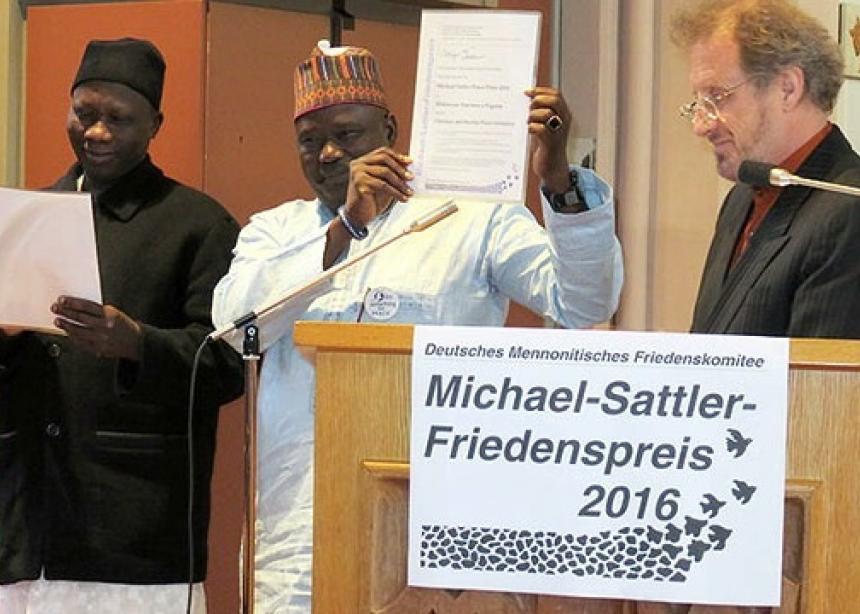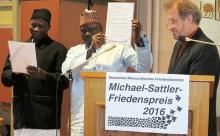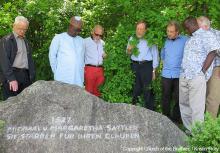The 2016 Michael Sattler Peace Prize has been awarded to the Ekklesiyar Yan’uwa a Nigeria (EYN) and EYN’s “Christian and Muslim Peace Initiative” (CAMPI), founded in 2010 with Muslim partners.
On May 20, 2016, the German Mennonite Peace Committee (Deutsches Mennonitisches Friedenskomitee, or DMFK) presented the prize to Ephraim Kadala, EYN pastor and peace coordinator, and Hussaini Shuaibu, lecturer, mediator and Muslim partner of CAMPI, who were representing their organizations.
The DMFK bestows the award to people or groups whose work is committed to nonviolent Christian witness, to reconciliation between enemies, and to promotion of interfaith dialogue. The award is named after the martyred 16th-century Anabaptist Michael Sattler and bestowed in the German city of Rottenburg am Neckar, where he was executed.
Ekklesiyar Yan’uwa is based primarily in northeastern Nigeria. As the largest Christian church in the region, it has suffered for years from attacks by the terror organization, Boko Haram. Of the 276 Chibok schoolgirls abducted in April 2014, the majority are members of the EYN. Approximately 2,000 of EYN’s church buildings have been destroyed, and more than 10,000 church members, including six pastors, have been killed. Thousands have been forced to flee their homes. Schools and seminaries have been destroyed or forced to close.
The DMFK recognized that, in spite of this aggression, the EYN has held fast to the peace witness of the gospel and has renounced calls for retaliation. The church teaches its members, and especially its youth, in the biblical way of peace and reconciliation, and has established contact with Muslims and mosques open to dialogue. In their peace and justice initiatives the church works to counter the economic and political sources of violence. Not only do they renounce violent confrontations—there are many examples of individuals putting love for enemies into practice—but they are actively contributing to the growth of peaceful co-existence between Muslims and Christians. A major focus of their work is instruction and training in conflict transformation.
At the award ceremony, renowned theologian and professor emeritus Jürgen Moltmann said, “With the utmost respect and reverence I stand before the church of the martyrs, both past and present: Michael and Margaret Sattler and the Anabaptist movement of the Reformation era, and now before the ‘Church of the Siblings,’ the Ekklesiyar Yan’uwa a Nigeria, who carried and carry the suffering of Christ today.” (In English, Ekklesiyar Yan’uwa means literally “Church of the Children of One Mother.)
Moltmann welcomed Kadala and Shuaibu as brothers “who show us an example of the work for peace and against terror and death.” He continued, “It is good when the Christian and Muslim Peace Initiative tries to dissuade young men from killing and being killed, and wins them back to life.”
Award committee member Karen Hinrichs praised the Nigerians’ spirit of nonviolence. She admitted that “we here in Germany are weak in the faith” and sometimes doubtful, thinking that military responses may be the answer, and that selling weapons to Nigeria may be a solution. “We need to learn from Michael Sattler that violence is not the answer.” She reminded the gathering to not pay attention to what is reported in the media about Nigeria but to look at the reasons why people become terrorists or refugees, ask how the weapons get there, and finally “make a difference. . . . Peace grows from good relationships.”
In his response, Kadala remarked, “We are not only walking in the footsteps of Michael Sattler and other peacemakers, but also in the footsteps of Jesus Christ.” He dedicated the award to the people who lost their lives in northern Nigeria, to the kidnapped girls from Chibok, and to all people of the world who love peace.
CAMPI mediator and teacher Shuaibu agreed with Kadala saying, “We’re on the same wave length.” He added that he hoped that the next Michael Sattler will come from Africa. The two Nigerians presented a copy of Kadala’s book, Turn the Other Cheek, to the German Mennonite Peace Committee and to Moltmann.
The Ekklesiyar Yan’uwa was established in 1923 by American missionaries from the Church of the Brethren (CoB), of the United States. Although the EYN has been independent since 1972, it continues to be supported by the CoB. Today, EYN has approximately one million members in over 2,000 congregations.
The Michael Sattler Peace Prize was first awarded in 2006 to mark the 50th anniversary of the German Mennonite Peace Committee. Wolfgang Krauss, member of the ecumenical prize committee, says that the exemplary commitment of EYN to loving its enemies makes it an especially deserving recipient of the peace prize. It was for this same reason that the early Anabaptist Michael Sattler (1490-1527) was executed on May 21, 1527. Sattler advocated that the “Turkish threat” of his time be countered not with violence but with prayer and love: “Christians are fully yielded and have placed their trust in their Father in heaven without any outward or worldly arms.”
Kadala and Shuaibu’s visit included a two-week tour in about 10 German cities, where they spoke in mosques, Mennonite congregations, Protestant churches, and with the German Fellowship of Reconciliation. Their visit to Rottenburg included a stop at the place outside the city gates where Sattler was tortured, burned and executed, and where a stone has been erected in memory of Michael and Margaretha Sattler.





Add new comment
Canadian Mennonite invites comments and encourages constructive discussion about our content. Actual full names (first and last) are required. Comments are moderated and may be edited. They will not appear online until approved and will be posted during business hours. Some comments may be reproduced in print.